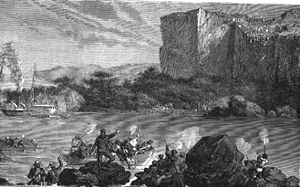
Siege of Medina Fort
Encyclopedia

Médine, Mali
Médine is a small town and principal settlement of the commune of Hawa de Mbaya in the Cercle of Kayes in the Kayes Region of south-western Mali...
near Kayes
Kayes
Kayes is a city in western Mali on the Sénégal River, with a population of roughly 100,000 people. Kayes is the capital of the administrative region of the same name. The name "Kayes" comes from the Soninké word "karré", which describes a low humid place that floods in rainy season...
modern-day Mali
Mali
Mali , officially the Republic of Mali , is a landlocked country in Western Africa. Mali borders Algeria on the north, Niger on the east, Burkina Faso and the Côte d'Ivoire on the south, Guinea on the south-west, and Senegal and Mauritania on the west. Its size is just over 1,240,000 km² with...
, when the Toucouleur
Toucouleur
The Toucouleurs are a Fula agricultural people who live primarily in West Africa: the north of Senegal in the Senegal River valley, Mauritania, and Mali.-History:...
forces of al-Hājj Umar Taal unsuccessfully besieged French
France
The French Republic , The French Republic , The French Republic , (commonly known as France , is a unitary semi-presidential republic in Western Europe with several overseas territories and islands located on other continents and in the Indian, Pacific, and Atlantic oceans. Metropolitan France...
colonial
Colonialism
Colonialism is the establishment, maintenance, acquisition and expansion of colonies in one territory by people from another territory. It is a process whereby the metropole claims sovereignty over the colony and the social structure, government, and economics of the colony are changed by...
troops under General Louis Faidherbe
Louis Faidherbe
Louis Léon César Faidherbe was a French general and colonial administrator. He created the Senegalese Tirailleurs when he was governor of Senegal.- Background :...
, governor of Senegal
Senegal
Senegal , officially the Republic of Senegal , is a country in western Africa. It owes its name to the Sénégal River that borders it to the east and north...
.
Origin
France at this time was struggling to create a West AfricaWest Africa
West Africa or Western Africa is the westernmost region of the African continent. Geopolitically, the UN definition of Western Africa includes the following 16 countries and an area of approximately 5 million square km:-Flags of West Africa:...
n empire to rival the holdings of its powerful neighbor Britain
United Kingdom
The United Kingdom of Great Britain and Northern IrelandIn the United Kingdom and Dependencies, other languages have been officially recognised as legitimate autochthonous languages under the European Charter for Regional or Minority Languages...
. The previous year, the French legislature
Government of France
The government of the French Republic is a semi-presidential system determined by the French Constitution of the fifth Republic. The nation declares itself to be an "indivisible, secular, democratic, and social Republic"...
had voted the first funds for what would become the Dakar-Niger railway line, a key transportation system to link France's colonies. As the railroad line expanded toward the east, the army established a series of forts, moving troops and cannon
Cannon
A cannon is any piece of artillery that uses gunpowder or other usually explosive-based propellents to launch a projectile. Cannon vary in caliber, range, mobility, rate of fire, angle of fire, and firepower; different forms of cannon combine and balance these attributes in varying degrees,...
into them by steamship
Steamboat
A steamboat or steamship, sometimes called a steamer, is a ship in which the primary method of propulsion is steam power, typically driving propellers or paddlewheels...
where possible and overland where not.
In 1848, Umar Tall launched his jihad
Jihad
Jihad , an Islamic term, is a religious duty of Muslims. In Arabic, the word jihād translates as a noun meaning "struggle". Jihad appears 41 times in the Quran and frequently in the idiomatic expression "striving in the way of God ". A person engaged in jihad is called a mujahid; the plural is...
against neighboring Malinké regions. By 1855, his rapid expansion had led to several skirmishes with the French army. With the authorization of his ally, Khasso
Khasso
Khasso or Xaaso was a West African kingdom of the 17th to 19th centuries, occupying territory in what is today Senegal and the Kayes Region of Mali. Its capital was at Medina until its fall....
king Hawa Demba Diallo, Governor Faidherbe ordered a fort built at the Khasso city of Medina, not far from Kayes.
The siege
In April 1857, Umar Tall declared war against the Khasso kingdom, and marched on Medina Fort, their nearest outpost, with an army of 20,000 to 25,000 riflemen. He laid siege to the fort and began a series of assaults that resulted in hundreds of casualties for the Toucouleur army. In the 97 days that followed, the defenders' food supplies soon ran low, and the fort was on the verge of surrendering when Faidherbe arrived by steamboat with supplies and 500 reinforcements, breaking the siege.Consequences
Realizing the difficulties of attacking the well-equipped French, Umar Tall turned his attention to the neighboring Bambara EmpireBambara Empire
The Bamana Empire was a large pre-colonial West African state based at Ségou, now in Mali. It was ruled by the Kulubali or Coulibaly dynasty established circa 1640 by Kaladian Coulibaly also known as Fa Sine or Biton-si-u...
, soon conquering most of its territory including its capital of Ségou
Ségou
Ségou is a city in south-central Mali, lying northeast of Bamako on the River Niger, in the region of Ségou. It was founded by the Bozo people, on a site about from the present town...
. However, the French continued to expand their West African presence, conquering Ségou and the Toucouleur Empire
Toucouleur Empire
The Toucouleur Empire was founded in the nineteenth century by El Hadj Umar Tall of the Toucouleur people, in part of present-day Mali....
less than thirty years after Umar Taal's death.

